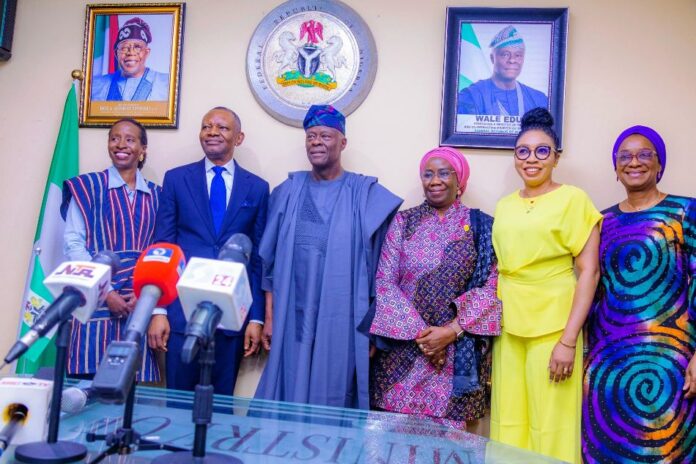
The Federal Government has outlined its strategy for achieving renewed stability and accelerated growth, with a focus on private sector-led investment, job creation, and improved public services.
Speaking at a media briefing today, in his office in Abuja, the Honourable Minister of Finance and Coordinating Minister of the Economy, Mr. Wale Edun shared the government’s vision for a more prosperous Nigeria.
He stated that the government’s economic strategy is anchored on two interrelated objectives: achieving a stable macroeconomic environment that supports private sector growth and building stronger government savings and public investment in critical sectors such as education, health, and infrastructure. This strategic approach, he explained, is designed to drive growth, create jobs, and improve public services.
Our task is to translate this into tangible improvements in the lives of Nigerians, through principally more jobs, and quality jobs that give higher incomes, and of course better public services, Edun said.
Despite global economic uncertainties, the Minister added that Nigeria’s economy is diversifying, with growth driven by sectors such as trade, communications, and construction. HM Edun noted that GDP growth reached 3.13% in Q1 2025, up from 2.3% in Q1 2024, while inflation moderated to 22.22% as of June 2025. Foreign exchange reserves stood at approximately $39 billion in July 2025.
He informed that the government has also settled outstanding capital budget obligations and is prioritising spending on critical sectors. The government, he added, is targeting 7% annual GDP growth, driven by private investment, infrastructure expansion, energy security, and food production. Key initiatives include implementing policies to support private sector growth, investing in critical infrastructure, and promoting agricultural development.
Our fiscal discipline and structural reforms are designed to build investor confidence and position Nigeria for sustainable, inclusive growth, the Minister said. We are committed to a coordinated fiscal and monetary policy framework that can substantially and sustainably reduce inflation, enabling cheaper capital for businesses so they can invest, and of course, greater purchasing power for households, Edun added.
The Minister also highlighted the government’s commitment to building an economy that works for everyone, with a focus on transparency, resilience, and purpose. Nigeria’s future growth depends on effective, honest, and targeted spending. We must ensure that public resources work harder for our people and our economy, he emphasized.
As the government continues to implement its economic reforms, it is expected that the economy will continue to grow and diversify, with a focus on private sector-led investment, job creation, and improved public services.
With this strategic approach, the Federal Government is confident that Nigeria’s economy will achieve renewed stability and accelerated growth, improving the lives of Nigerians and positioning the country for a brighter future.
Signed
Mohammed Manga FCAI
Director, Information and Public Relations
August 14, 2025





